“He who has a Why to live for can bear almost any How.”
– Friedrich Nietzsche
It’s 4:30 am, somewhere in Girona / Spain, May 2018, and I’m in a small studio… coding frantically.
The idea came 30 minutes ago, waking up at night and yelling at me:
“Get up and look at this!!, do you see it? Then do something about it!!”. Not the most gentle of muses.
I can’t wait for Cindy Marin (front-end coder, best teammate I-ve worked with and my life companion) to wake up and tell her all about it.
Meanwhile, *type, type, type*, I can kill some time testing this one out, it’s related to a Tim Ferris word frequency post, and the app in question, LingoStand, an app for language learning.
Cindy and I, you see, have been coding together for around 11 years as product developers, software consultants, and entrepreneurs.
However, this project has something different… like a book that you can’t put down.
After 2 years of committing to it, we are still so excited to work on it! It has taken a toll on our minds, souls and pockets.
Despite that, however, today I have an incredible motivation that pulls me up from bed every morning, lights my brain with solutions, clears my soul from fears and anxiety, and fuses my body with energy to keep working.
But it wasn’t like this from the beginning… far from it.
The LingoStand story has a lot of technical craziness, but I want to focus this conversation on life lessons that might help anyone out there with their project.
This article has 2 parts:
- A shortlist of the top 5 life lessons that have brought us tangible results, in our projects and other areas of our lives.
- The LingoStand journey, major key events, and decisions we have made while living these 5 lessons, together with some LingoStand secrets for the curious.
Here is our list! This list is becoming part of our culture and some of its principles are embedded into the app itself!
Part 1. Shortlist of the top 5 life lessons
- Be open and trust your past experiences, They hold the ingredients to be mixed in your next project, those ingredients that will make your recipe uniquely valuable.
- Get your ego out of the way: Share your work often, to reduce your ego to a little cheese ball, get used to being wrong, take criticism, develop the ability to take a punch… so you can ask valuable questions, and uncover valuable answers.
- Establish a rock-solid Meaning: Spend enough time writing the why of the project, this will infuse you with a motivation that will power your energy core in the most difficult of times. A quick tip: If the reason is bigger than yourself, your energy source will be many times more powerful. Responsibility is the ultimate form of freedom.
- Focus is key for tangible results when working on your project, find a way to block all possible interruptions for around 3 hours per session and have frequent sessions, if possible daily. Trust this session and commit to it, and let the magic come to you.
- Track your progress to harness the power of gamification, we humans need to feel that we are making progress. Find a metric that works for you, do a roadmap, and keep these two up to date. Making progress and feeling that you are making progress are 2 very different things, we need the latter.
Now, if I had to choose one… if I only had time to talk about one, I would choose number 3, meaning. I believe that is the one that makes the other possible
Because if there are strong enough reasons behind a project, everything else falls into place, you will have the courage to make the decisions thattake you to the destination, to build the habits that the project demands, to get out of your comfort zone when you need it the most.
Meaning is the compass that guides you in the storms to come, it is the domino that makes the other dominos fall.

If you want to dig deeper into this subject, I recommend reading Man’s Search for Meaning by Viktor E. Frank.
Part 2. The LingoStand journey
Lesson 1. Be open and trust your past experiences
“What you have experienced, no power on earth can take from you.”
— Viktor E. Frankl, Man’s Search for Meaning
The story about how it all got started takes me all the way back to when I was 12 years old. A Venezuelan kid with no English, living in Scottsdale/Arizona.
I was sent there with one objective only: to learn some English.
I’d have one year.
You see my parents weren’t born rich — -quite the opposite. But they had good jobs thanks to their studies and hard work, and they always believed in investing in education, which is something I give thanks for every day.
But you see, the language and culture barrier can make a little boy feel incredibly lonely.
One day, however, Lady Luck would guide me to my first “First World” public library. It changed my life forever.
As I entered the Scottsdale Public Library / Civic Center, I was immediately struck.

Racks of thousands of books that climbed up into the ceiling, and stretched down into a vanishing point of halls without end.
Rows after rows, all types of books, in all varieties of colors and in topics that I had never heard of. There were so many of them.
When Foster Wallace says that literature helps us being less lonely… Man is he right.
I had a feeling, I was not going to be alone for much longer.
There was one, tiny, catch. My knowledge of English was basically null.
Now, why was that? Didn’t I go to school for a few years? Didn’t I had at least a basic grasp of it? Was I stupid? I was stupid, I was certain of it.
I had probably one of the lowest, if not THE lowest, English grades in my class back in Caracas, Venezuela.
Somewhere in the 90s at an Elementary School in Caracas / Venezuela
“The ball is ON the table…. the ball is UNDER the table, now the ball is NEAR the table…” I understand the message now, it was never about the freakin’ ball! We were learning prepositions! cool, but who cares where the ball is? A child doesn’t like to learn like that, or anybody else for that matter.
I think this method created the following chain effect in my subconscious:
- Bored out of my mind!
- Not paying attention
- Fluked the test
- Association created: English = A World of Pain
It has been demonstrated, again and again, the reason we humans like to play and have fun is that in that emotional state we learn effortlessly.
My first experience with fun reading…

I will never forget the first book I read out of my own motivation. It was Mega Man 2. One of those Worlds of Power books they made in the ’90s.
Big, colorful, with action scenes in the cover, and a familiar face for a kid to relate to.
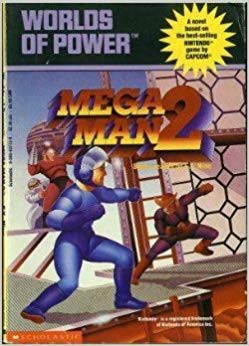
“‘Welcome, welcome’, said Dr. Light…”. Oh man. It was speaking to ME. It was welcoming me!
I did not care about the ball at all, BUT this book had Mega Man, and Bubble Man, and Dr. Light, and “CRASH! CRASH! POW! BAM!” sounds! and Wily. But it had so many words, man. I wanted to know what was happening. What was he thinking while facing Bubble Man. What were they saying!
And so, a slow relationship with reading started to flourish.
But holy sh*t was it hard…
I had to use an old fashion printed English/Spanish dictionary to get through it. I’d have to go back and forth between the pages, connect the word with that other word and oh that was a full sentence and that sentence meant THAT…. AHHH.. Oh, the joy.
It was a slow read, but I was in no hurry.
After that first experience, I was hooked. I needed more. I began to try other books, those with the coolest covers were the best ones.
When you’re a kid you DO judge a book by its cover!
So, in time, as I read books that I liked, and went to school, I started to understand, and very slowly, dared to speak the English language.
But learning a language was never the objective, listening to the characters were, living the drama, the story, the experiences.
We should aim to what’s behind the language, the message, that which is universal.
Languages are the ships, vessels, they carry a message, filled with wonderful people, life experiences, job opportunities, new cultures, and different ways of thinking.
As a native Spanish speaker, learning English is a skill that changed my life forever.
But more life-changing was my newfound habit, the new love for reading.
An unexpected meeting that changed our lives
An unexpected meeting that changed our lives
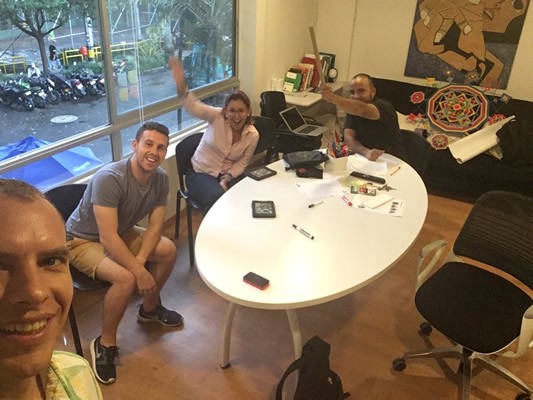
Now, jump 25 years or so ahead
Ernesto: Hello, what you doing there? Learning Spanish?
An obvious question to the person next to me on a plane departing from Medellin to the USA. Ryan was reading words in Spanish and making a visible effort to memorize them
Ryan: Yeah man, I’m into this method, it’s working out!
It’s amazing how things just happen when least expected. Like if we were guided. I’m always wondering about this type of events.
It went something like this:
- Me listening to a Tim Ferris podcast which led to…
- Getting a copy of a book called The Magic of Thinking Big… which, when put in practice, led me to…
- A plane to the USA to a consultancy project, and into talking to the person beside me, Ryan Iacovello, a Canadian who is really into software (Both events as a result of following that book), which led us to…
- A meeting with Fabian Bedoya, an excellent English teacher and our current partner, both of them were working on a language app, and this led to…
- A venture of mutual collaboration, which started by going through a Google Sprint Design method in Medellin
Learn using content that matters to you was their pitch… made sense for some reason…
“Meaning, form, and pronunciation are the 3 usual suspects on language learning…” explained Fabian Bedoya when introducing us to the idea.
Cindy and I needed a moment to process our future partner.
Is he Canadian or American? He looks Colombian… but then he speaks native English… hmm…
“Form and pronunciation is 66% of learning that is invisible to students. We base most of our learning on form as in patterns, whether it’s sound or print”
He can go on and on…
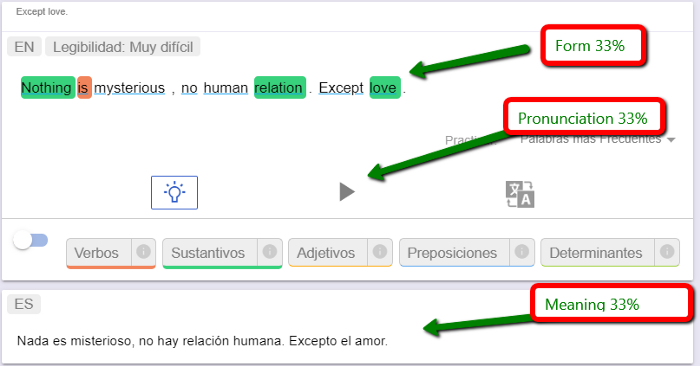
“…we want to help users to develop their own intuitive knowledge of correct use…”
Pattern recognition… Exposure, Intuition… This is resonating with my experience. Interesting…
That was our beginnings with LingoStand.
Lesson 2. Get your ego out of the way
The brighter the light, the darker the shadow.
— Carl Jung
Oh yes! that wonderful day when the first set of users feedback comes in, and your delusions of grandness dissolve into a rain of WhatsApp messages:
“How can I learn using this content if I don’t understand anything here? this sucks man”.
“I need help with listening and pronunciation!”.
“What? are you teaching random words? What is that good for anyway?”
“Tried to use the fill the blanks game with an article and it brakes. It’s not usable with long paragraphs! This is a Time Waster!!”
“Etc.., etc…, etc…”
That first version was useless even for me. Blinded by my own illusions, what can I say. Sometimes you get too close to see…
I heard that the ability to take a punch supposed to be what separates pre-Napolean armies from post-Napolean armies and I would argue it’s an invaluable life skill to develop.
Lesson 3. Establish a rock-solid Meaning
Thanks to that feedback, the journey got real, and turned a fake dream of a perfect world into a real story of testing, taking criticism, and asking our selves…
How can it be better for them? for us?
And then having the courage to put your time and money to make it better, and test again.
Because we chose to believe we could make it better, that it would help others and ourselves. We acquired a sense of responsibility, only because we chose to. And now, our ego mattered zero.
We decided to add languages that we needed to learn and really scratch our own itch.
We have Italian, English, French, Spanish, German for target languages, and English and Spanish as native ones.
And so we decided to take challenges one by one.
And here, our first one:
Reading in another language can be incredibly frustrating! It’s easy to get stuck.
LingoStands aims so that all of us can have the same experience I had for learning, but 100x times easier, fun and effective. I had lots of time when I was a kid. It was imperative that we reduce the time required by using LingoStand.
But before getting close to that, it needed something critical, something solid to lay or work, some kind of framework…
Enter Tim Ferris
Barcelona, Spain 2017… “We are going to Sicily!! Woohoo!”
I was very happy! I have heard stories of San Giuseppe Jato from my mother since I was a kid.
The mountains, the people, the food, the sea. All of the family there. Cousins and more cousins! … but oh yeah… I don’t speak Italian. Man… this again…
“Perché ragazzo? Perché non parli Italiano!!!”
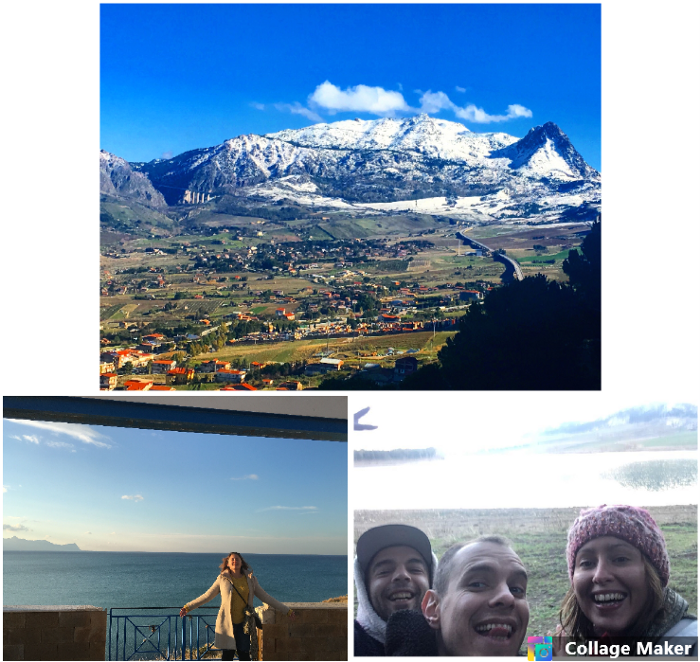
Weeks before the trip, after failing to form sentences using Duolingo alone, I turned to my mentor for a quick win… a mentor you know, this person that has been constantly on my life for about 10 years now, he and his content has guided me so much and has had such a huge impact in my life!
I’m talking about the optimal minimal Tim Ferris, book author, blogger, podcaster, researcher, and many other things… And he… well, he has no idea who I am 😅. But that has not prevented him from giving me solid advice in the past or pointing me to the right source.
Finding his first book 10 years ago, The Four Hour Workweek has been one of the best things that have ever happened to me, the life-changing book that sent me in an endless path to more life-changing books. Don’t be deceived by its title, it’s practical yes, but also very deep.
So thank you, Tim, for all of your hard work, you make a difference every day in this world.
A search in google for “language learning Tim Ferris” brought me to a blog post he made about this subject “How to Learn Any Language in 3 Months”, and I could not believe it, he shares the outlines of a method he has used for effective language learning with Time Ferris results! which means for me, faster results with less effort.
Among many things described in the article, he writes about 3 main elements:
1. Effectiveness (Priority)
2. Adherence (Interest)
3. Efficiency (Process)
The first thing that made an impression is that, again, he talks about always using content you would read in your own language:
Adherence: Review, and multiple exposures to the same material, will always present an element of monotony, which must be countered by an interest in the material.
Hmm… First my experience as a kid, then the Colombia experience, and now this post…
The Adherence concept was awesome, but what was new to me, was the first item on the list:
Effectiveness: If you select the wrong material, it does not matter how you study or if you study — practical fluency is impossible without the proper tools (material). Teachers are subordinate to materials, just as cooks are subordinate to recipes.
He recommends later to start by learning the words based on its frequency usage in that language:
Pareto’s Principle of 80/20 dictates that 80% of the results in any endeavor come from 20% of the input, material, or effort…
And later on
…If you were a student of English (though the list can be adapted to most languages), the following words would deliver the greatest ROI (Return of Investment) per hour invested for the initial 1–3 weeks of study:
And then he lists the 100 most common words.
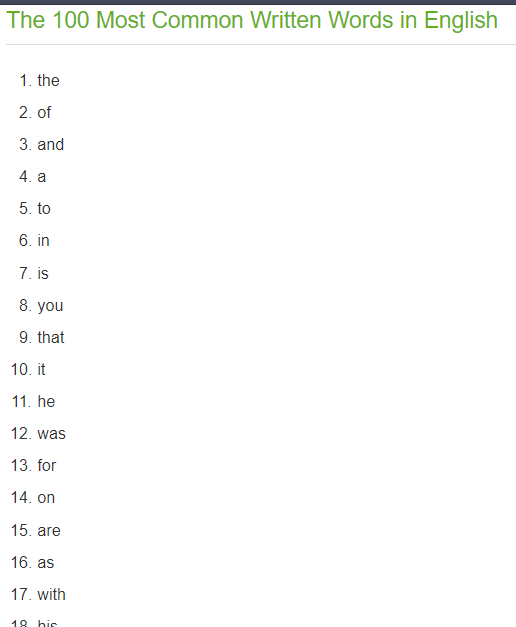
The first 25 of the above words make up about 1/3 of all printed material in English. The first 100 comprise 1/2 of all written material, and the first 300 make up about 65% percent of all written material in English
BIN-f****g-GO.
We had it. We made Word Frequency the most rewarded learning method in LingoStand and embedded into the app experience.
LingoStand has the first 2.500 words on every supported language and aims to teach them to you by frequency order.
Sadly I could not test it at the time for my Italian, basically because of the lack of frequency word list in Italian. Man, I wish I had understood more on that trip.
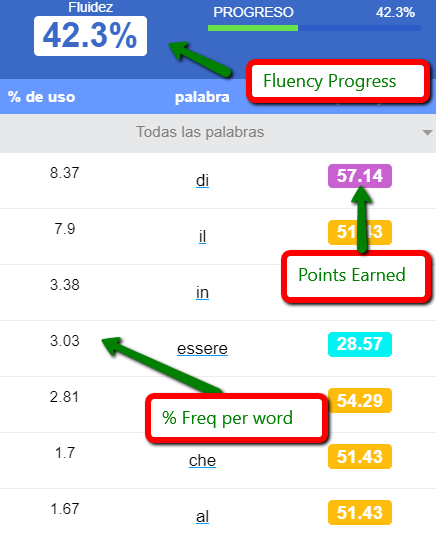
Finally, the last element:
Efficiency: It matters little if you have the best material and adherence if time-to-fluency is 20 years. The ROI won’t compel you. Ask yourself: Will this method allow me to reach accurate recognition and recall with the fewest number of exposures, within the shortest period of time? If the answer is no, your method must be refined or replaced
Oh man… now, this was the fuzzy part, or rather, this IS the fuzzy part. ’Cause efficiency is not that easy to measure, is not that easy to design, is not that easy to code, is not that easy to build, test, debug, deploy, release. Efficiency is not easy to nuthin’!
But thanks to this challenge, we have been experimenting and learning with NLP, a set of Artificial Intelligence models aimed at linguistics, together with Gamification: The art of making the user experiences fun and rewarding.
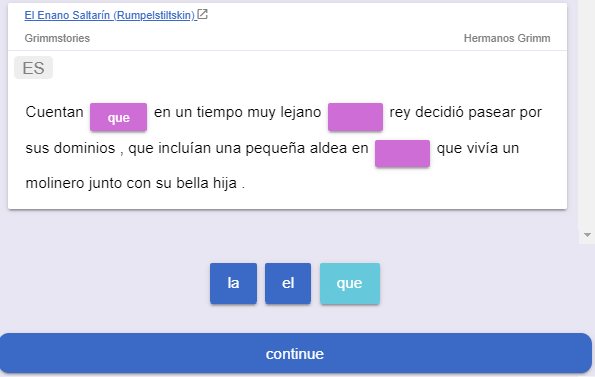
Lesson 4. Focus is key
Eddy Murphy: You got to put time in to make something happen, you know, that’s worthwhile. Now you got so many options, it’s like, it seems hard to focus on something.
Jerry Seinfeld: The lack of focus, its why we have a lack of greatness…
— Comedians in Cars Getting Coffee 2019, Season 11, Episode 1
We believe so much in focus, that we put a lot of effort into providing users a focused experience.
In LingoStand, we treasure attention, we value it because we believe that it’s the most valuable assets that we humans have.
Sadly the ever-streaming ads and publicity continually feed on our attention, sucking its value and transforming it into money.
LingoStand aims to nourish our attention, for our language learning, for our overall growth and well being.
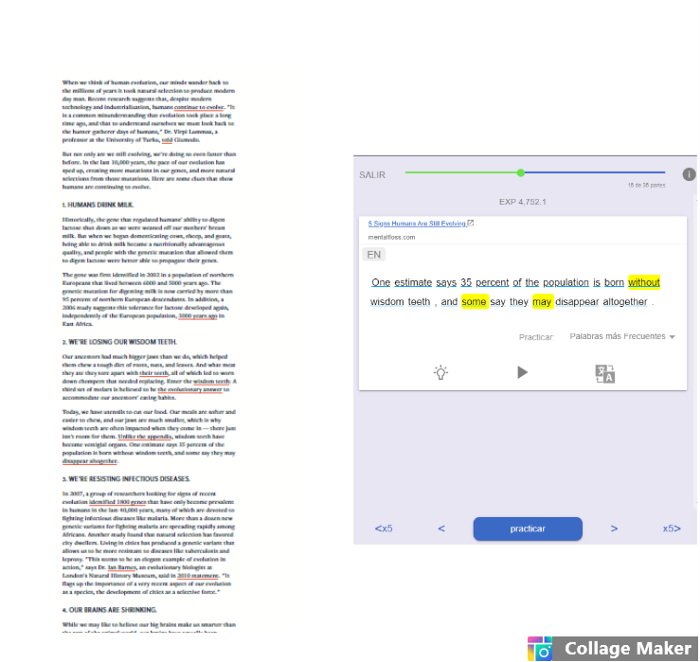
The cultivation of attention is the distinguishing characteristic of
every successful man or woman, and is the very highest personal accomplishment which can be acquired. — Charles Haanel
A.I. and the context challenge
NLP which stands for Natural Language Processing, and it’s the branch of artificial intelligence (A.I.) focused on languages that used to work horribly 6 years ago, and now it’s working remarkably well.
Not 100% well, but enough to be incredibly useful.
Is it not scary when Gmail finish your sentences?
Creating games, explaining grammar, listening and translating whole sentences … these were things that were not possible using your own content.
One big problem is that words can have a different meaning, in a different context, so using a dictionary alone can lead to a very frustrating experience when reading a sentence, let alone a book.
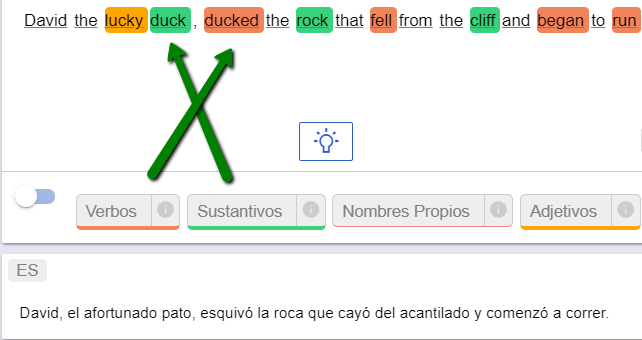
And this is why most methods could not support your favorite Judo book.
NLP breakthrough in the academic and business fields are more active than ever, and being able to develop practical applications at the service of common users is a project that fills our team with love and meaning.
Lesson 5: Track your progress to harness the power of gamification
Cindy, you’re giving me a fight! Haha I like your attitude, it encourages me to use the app much more to maintain my position, among other things, of course. I will not surrender easily xD
— Juliana Marin
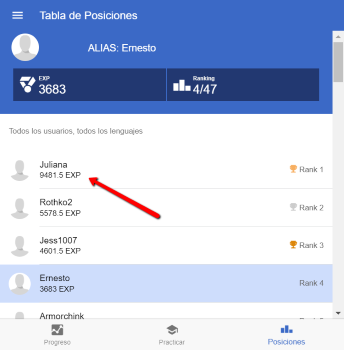
I am always changing the conditions of my practice, sometimes I select the time in medium speed and sometimes in advanced, but never in easy. I never highlight the words, I think it’s very easy that way, I like to make it more difficult without clues. Also, I always select 5 words, since I implemented it I used it like that, it could even be more: p
— Juliana Marin, Lingostand user
Juliana used the app prior to gamification, but after we added that leaderboard and dug deeper into points and rewards, well she has become a force of nature.
So her English improves and improves, it’s real exposure to the language.
It’s empowering gaming. Gamification for the good of humans.
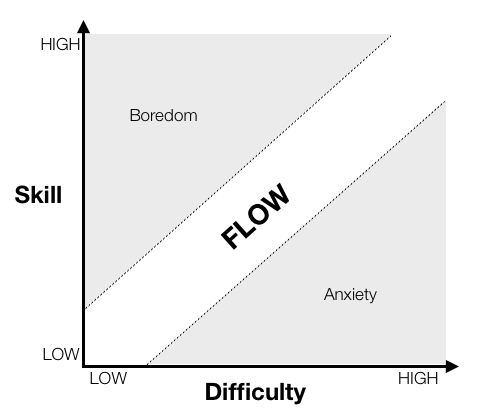
Now, this is a fascinating topic for me.
Why is this? Why is that that when adding gamification correctly, it compels users to put so many hours into a task?
…Playing World of Warcraft is such a satisfying job, gamers have collectively spent 5.93 million years doing it.
— Dr. Jane McGonigal book Reality is Broken, 2004
Humans need to FEEL productive, not to BE productive. It’s not easy to align these two: feel and being.
Even if we are being productive at work, or learning about prepositions at school, we do not FEEL productive. And playing Mega Man even if it’s not being productive, made me FEEL productive, hell it felt like I was saving the world!
But what if we can feel productive, and being productive at the same time?
Our first real user: A wealth of motivation, meaning, and direction for value.
I remember how I felt that day clearly, I will never forget it. I remember it because I had never had that feeling. Our first real feedback, a happy user, that reported that the app was working for her, that it touched her life.
As I read the email, I felt a big load of freshwater washing my heart, healing it, infusing it with a new energy source.
As I read the email, I felt a big load of freshwater washing my heart, healing it, infusing it with a new energy source.
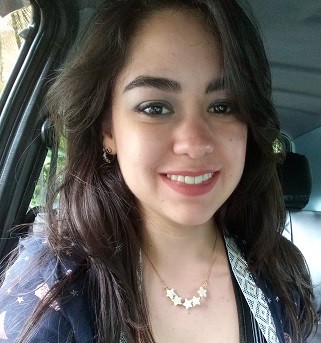
I must admit that I love the application, I use it every day and sometimes more than once a day. I like the didactics of it, the articles are interesting, I love the modifications that have been developed and I really feel like my English is improving.
— Juliana Marin. LingoStand User
I was instantly high. The next day I woke up as if some invisible force pulled me out of bed to get me to work.
… it is amazing to see how you have made so much progress in such a short time, you are an excellent team and I really want the public to begin to know this tool to learn a second language or more. I want to be a Lingostand user always! (:
— Juliana Marin
Message after message, day after day, she told us what worked and what didn’t for her, we as users started to add our own feedback, and together we kept building.
And as I went to work that morning, I realized, I had changed, thanks to those lesson after lesson put into practice, they have been added to my personality, like layers of lasagna.
We as a team had changed, for the better.
I knew then that we were far from done, but that more changes would come. As I walked the streets that morning I remember thinking… who will I become if I continue this journey?
What will this journey make of me, and how far can LingoStand touch others, for the better?
Are you willing transformed? To take on a new journey?
LingoStand Links:
I hope you enjoyed this story and hopefully found something that you can use for your own projects.
If you happen to try LingoStand and want to be part of its journey, please don’t be a stranger…
- Contribute to keeping LingoStand free for everyone at https://www.patreon.com/lingostand
- Got to https://lingostand.com/ to leave feedback, get in contact with us, or try the app in web, iOS or Android.
- Go to the YoutTube channel for how to’s and more LingoStand content.
- You can also twitter me directly at https://twitter.com/poolebu
Special Thanks to Cindy Marin, for her unconditional love, and outstanding work.
To the LingoStand team, and to everyone that have put time and effort in this project.
Special Thanks to Horacio Baquero for helping me with this and past articles, and for making my writing more enjoyable each day.
